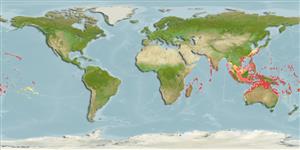Common names from other countries
Issue
The species Paracirrhites amblycephalus (Bleeker 1857) is considered as valid in Eschmeyer (CofF ver. May 2011: Ref. 86870). Please send references, or more studies are needed.
Environment: milieu / climate zone / depth range / distribution range
Écologie
marin récifal; profondeur 0 - 91 m (Ref. 37816), usually 1 - 33 m (Ref. 27115). Tropical; 35°N - 35°S, 24°E - 124°W
Indo-Pacific: East Africa to the Hawaiian, Line and Mangaréva islands, north to southern Japan, south to Australia and Rapa.
Taille / Poids / Âge
Maturity: Lm ? range ? - ? cm
Max length : 20.0 cm TL mâle / non sexé; (Ref. 48636)
Épines dorsales (Total) : 10; Rayons mous dorsaux (Total) : 11; Épines anales: 3; Rayons mous anaux: 6. Occurs in a variety of color morphs, but always has a distinctive ring extending around and behind the eye (Ref. 37816, 48636).
Occur in lagoon and seaward reefs from 1 to at least 33 m, on heads of small branching corals, e.g. Stylophora, Pocillopora, Acropora (Ref. 9710). Benthic (Ref. 58302). Feed mainly on shrimps, small fishes, crabs, and other crustaceans (Ref. 2334). Solitary (Ref 90102). Minimum depth reported taken from Ref. 128797.
Life cycle and mating behavior
Maturities | Reproduction | Spawnings | Egg(s) | Fecundities | Larves
Distinct pairing. Spawning ascents into the water column occurred over a distance of 0.4 to 1.0 m (Ref. 26305).
Randall, J.E., G.R. Allen and R.C. Steene, 1990. Fishes of the Great Barrier Reef and Coral Sea. University of Hawaii Press, Honolulu, Hawaii. 506 p. (Ref. 2334)
Statut dans la liste rouge de l'IUCN (Ref. 130435)
CITES (Ref. 128078)
Not Evaluated
Menace pour l'homme
Harmless
Utilisations par l'homme
Pêcheries: sans intérêt; Aquarium: Commercial
Outils
Articles particuliers
Télécharger en XML
Sources Internet
Estimates based on models
Preferred temperature (Ref.
115969): 24.5 - 28.8, mean 27.5 (based on 892 cells).
Phylogenetic diversity index (Ref.
82804): PD
50 = 0.5156 [Uniqueness, from 0.5 = low to 2.0 = high].
Bayesian length-weight: a=0.00933 (0.00367 - 0.02375), b=3.07 (2.85 - 3.29), in cm Total Length, based on LWR estimates for this (Sub)family-body shape (Ref.
93245).
Niveau trophique (Ref.
69278): 3.6 ±0.4 se; based on diet studies.
Fishing Vulnerability (Ref.
59153): Low vulnerability (10 of 100).
